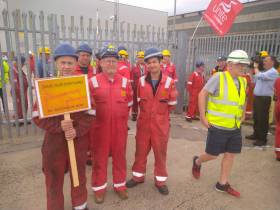Displaying items by tag: workers protest
Harland and Wolff workers, writes BBC News, have closed the shipyard's gates as part of a protest following news that the business is up for sale.
They have demanded Boris Johnson's government renationalise the yard and saves their jobs.
The protest began on Monday afternoon and has continued into the night.
The Unite union said workers decided to take this action ahead of the expected arrival of administrators on Wednesday.
A spokesman for the Norwegian parent company of Harland and Wolff said the company had no comment to make at this stage.
For more on the story, click here.

























































